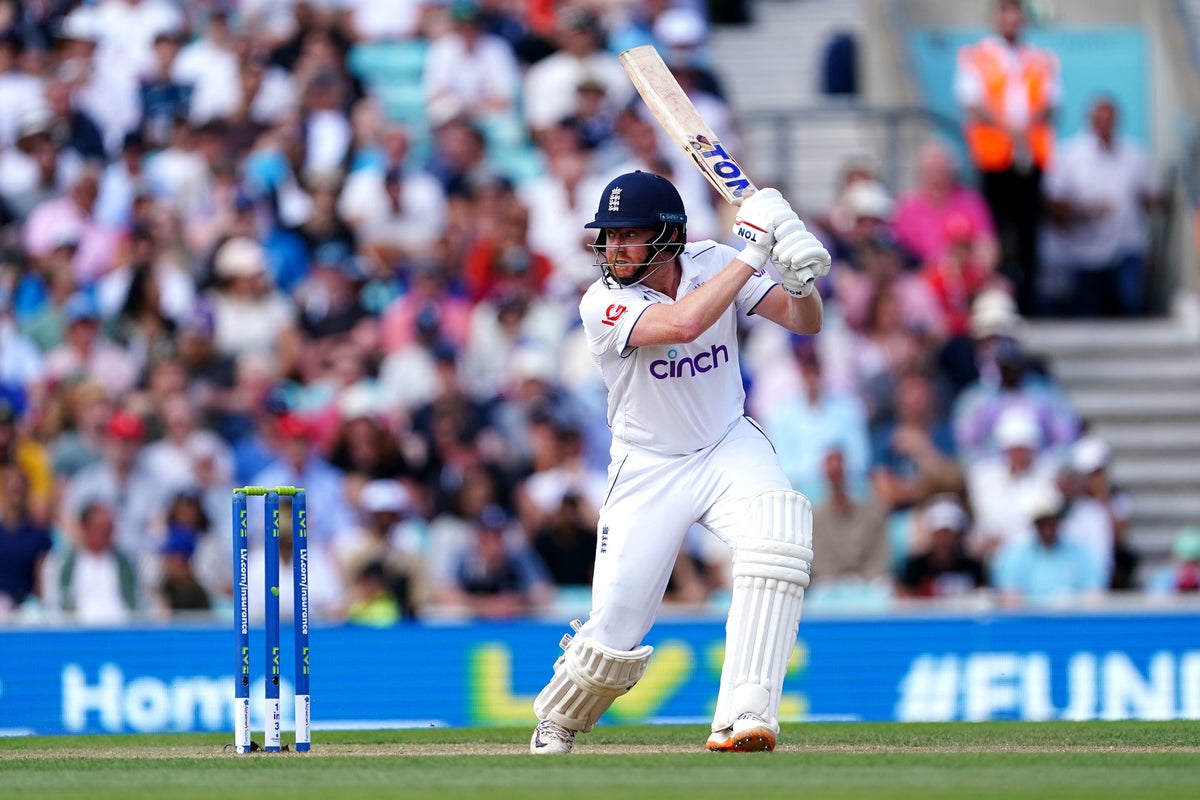
It was not a day for centuries, or individual heroics, but rather a complete team performance as England put pressure firmly on Australia by scoring 389 runs in a day, with a lead of 377, before Stuart Broad’s bombshell announcement that this would be his last game of cricket.
Broad, the second highest wicket-taker in England’s history, delivered the news on Sky Sports at stumps.
“Tomorrow or Monday will be my last day of cricket, it has been a wonderful ride, a huge privilege to wear the Nottinghamshire and England badge as much as I have and I am loving cricket as much as I ever have,” he said at the close of day three.
“This series has just felt like it’s been one of the most enjoyable and entertaining and I always wanted to finish at the top.”
England certainly set themselves up to give Broad the perfect ending.
The start to their second innings on the morning of day three could not have been more different than Australia’s the day before. Zak Crawley stood tall and punched a wide half volley from Mitchell Starc to the cover boundary, and England were off and running, in much the same way as he had played the first ball of the series, strong and on the attack.
From that point, the hosts never looked back. Starc’s first over yielded 13 runs, and they had already established a lead, having trailed by 12 after both sides had batted once.
For a side that loves to break records, there was one in the afternoon that will surely bring a smile to Ben Stokes’s face. When Joe Root ramped Mitchell Marsh over Alex Carey’s head for six, it was England’s 41st of the series, beating the previous record for the most in an Ashes series, which was 40, set by Australia during the 2013-14 Ashes.
There were fielding errors from the Australians as Crawley and Ben Duckett capitalised, scoring more runs than Australia did in the entire morning session the day before in just 9.5 overs and before the drinks break.
Whereas the morning on the second day was branded dull and moved at a glacial pace, there was never any doubt that Bazball England would look to attack from the outset.
For a side that has historically been aggressive and prided itself on taking the game to the opposition, it was a slightly odd sight at the Oval where it felt like the game was happening to Australia and they were struggling to impose themselves on it.
Zak Crawley provided the impetus for England in the morning session before finishing with 71— (Getty Images)
There were good balls from the Australian bowlers, notably the one that did for Harry Brook, who was out for just seven edging behind, but England were never stifled as their opponents had been, nor did it feel like they truly had to absorb any pressure.
Crawley hit 73 before he was out just after lunch, with an attempted drive going straight to the slip cordon, and he was applauded off the field, having scored 480 runs across the five Test matches at 53.3.
After the wickets of Crawley and captain Ben Stokes, it was the turn of the two Yorkshiremen in Jonny Bairstow and Joe Root.
Root played a typical innings, including the reverse scoop that has been one of the shots of the series, bringing up 50 from just 42 deliveries when England were 213 for two.
Joe Root sweeps a ball towards the boundary on his way to making 91— (AFP )
The former England captain was eventually out for 91 from 106 when a ball from Todd Murphy turned and kept low to bowl Root, but while in previous eras a big wicket might have sparked a collapse, the side just carried on in the same manner.
In the final hour of the day, England tried to put on as many runs as possible, with Mark Wood reverse-scooping, and all of the tailenders trying to hit from their first ball.
James Anderson got a standing ovation with all corners of the ground singing his name when he walked out to the middle, it seemed like many in the crowd felt like it could be his last time with bat in hand for England, despite his insistence that he wants to keep playing.
His two boundaries were cheered more than any other shots played, and England closed out the day 389 for nine.
But it was Broad, not Anderson, who then brought down the curtain on one of England’s greatest Test careers.







